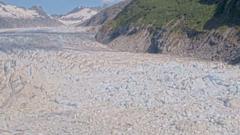Despite initial warnings, the ocean's rising temperatures have significantly affected marine wildlife, particularly seabirds. New insights reveal a shocking decline in the population of common murres in Alaska due to a series of environmental changes linked to unprecedented marine heat waves.
The common murre, a black-and-white seabird native to the Alaskan coast, has seen a substantial population drop, with an estimated four million birds perishing, according to a recent study published in the journal Science. This staggering loss accounts for about half of Alaska's common murres, marking what scientists believe to be the largest recorded decline of any single wildlife species in the region.
Researchers have traced the downfall of these birds back to a marine heat wave nicknamed “the Blob,” which began affecting the northeast Pacific in 2015. The warm waters disrupted the local food chain, leading to a collapse in fish populations that murres depend on for sustenance. Between 2015 and 2016, observers reported finding over 62,000 dead murres along the coasts from California to Alaska.
Heather Renner, one of the study's authors and a wildlife biologist at the Alaska Maritime National Wildlife Refuge, emphasized the extent of the crisis: “What we learned was that it was just way worse than we thought.” This statement underscores the growing concern among scientists regarding the vulnerability of ecosystems in a warming climate.
The findings related to the murres are part of broader research indicating that numerous marine species, including plankton and larger animals like humpback whales, experienced significant mortality or displacement due to the same environmental changes. As climate conditions continue to shift, the implications for marine biodiversity and ecosystem health become increasingly dire, making it crucial to address the factors driving these changes.
The common murre, a black-and-white seabird native to the Alaskan coast, has seen a substantial population drop, with an estimated four million birds perishing, according to a recent study published in the journal Science. This staggering loss accounts for about half of Alaska's common murres, marking what scientists believe to be the largest recorded decline of any single wildlife species in the region.
Researchers have traced the downfall of these birds back to a marine heat wave nicknamed “the Blob,” which began affecting the northeast Pacific in 2015. The warm waters disrupted the local food chain, leading to a collapse in fish populations that murres depend on for sustenance. Between 2015 and 2016, observers reported finding over 62,000 dead murres along the coasts from California to Alaska.
Heather Renner, one of the study's authors and a wildlife biologist at the Alaska Maritime National Wildlife Refuge, emphasized the extent of the crisis: “What we learned was that it was just way worse than we thought.” This statement underscores the growing concern among scientists regarding the vulnerability of ecosystems in a warming climate.
The findings related to the murres are part of broader research indicating that numerous marine species, including plankton and larger animals like humpback whales, experienced significant mortality or displacement due to the same environmental changes. As climate conditions continue to shift, the implications for marine biodiversity and ecosystem health become increasingly dire, making it crucial to address the factors driving these changes.





















